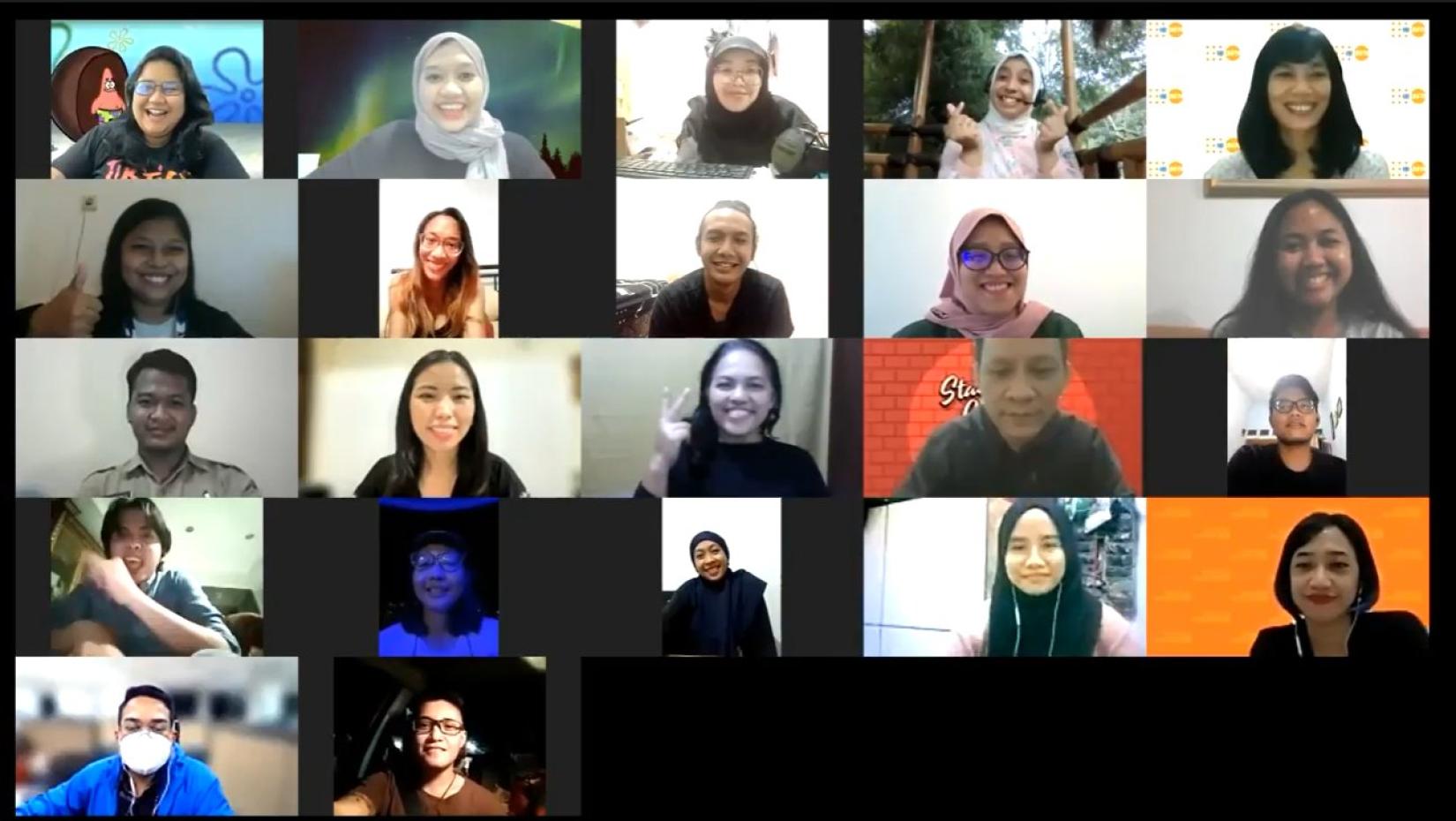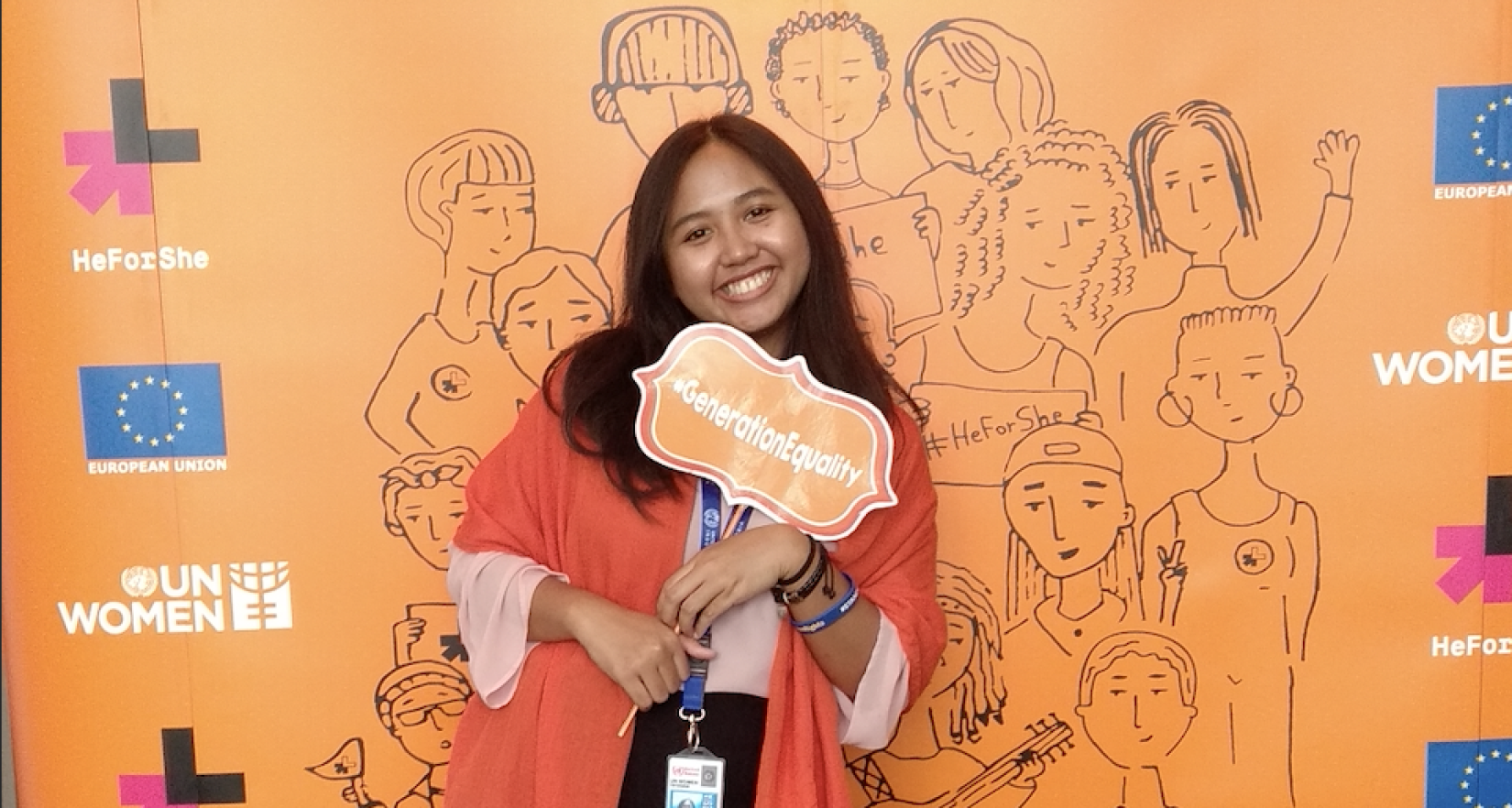Gender Equality, Women’s Rights and Impact of Social Media Communications

Read how Bintang's experience as a UN Volunteer teaches her the power of social media to advance gender equality and strengthens her spirit of volunteerism.
Bintang Aulia’s volunteering work started in 2016 during her last year of university, when she joined a climate movement in Bandung. She participated for a year learning not only about the environment and what she can do to help the earth but also about how volunteering works.
After graduation, she worked as a teacher for a while before continuing her Master's, majoring in Japanese Area Studies. “I learned more about social and political issues, particularly on the issue surrounding women. These resonated with my own experience, and I became interested in knowing more.”
During this time in 2019, Bintang joined UN Women Indonesia as Communications and Social Media Intern. Her primary role was to support the Communications unit with advocacy works and maintain online presence on social media. The assignment made her learn about gender equality, and she participated in the 16 Days of Activism against Gender-Based Violence campaign.
“We launched our joint publication with Pulse Lab Jakarta, ‘After Dark’, about the challenges, strategies, and impact of traveling at night for women in Indonesia. ‘After Dark’ revealed that women are vulnerable to harassment in public spaces, and the risk tends to increase during the evening hours. This greatly impacts their mobility and travel choices, as well as limits their participation in public spaces. During the launch event, we exhibited part of the publication and discussed creating a safe public space and city for women and girls.”
The event left a great impact on Bintang. As she saw people learning about women’s challenges of traveling at night from the exhibition, she realized that communication and advocacy work helps people understand things they won’t understand otherwise, and that relevant information could lead to better conditions for women and girls all over the world. It was then that Bintang decided this is what she wants to do, and this is how she can contribute towards a better future.
“With that knowledge and newfound determination, I continued on my path and stumbled upon UN Volunteer.”
As Bintang got to know the UN program and its people, she realized how important volunteers are for the UN. Be it their expertise or time or be it their effort, the UN Volunteers are passionate about what they do. These values resonated with her passion. And in 2021, she started her journey as a UN Volunteer.
“I was able to continue my previous internship with UN Women Indonesia for my first assignment as a UN Volunteer. Ever since then, I learned much about the state of women’s rights, women empowerment, and gender equality.”
Unfortunately, Bintang’s assignment coincided with the pandemic and like all others, she was forced to change her way of communication. During this period, she supported the UN Joint Campaign on social media for the 16 Days of Activism 2021.
In the words of Bintang’s supervisor Ms Radhiska Anggiana, Advocacy and Communications Analyst, UN Women Indonesia, “We recognize the immense value of volunteers who are at the forefront of action for change. Volunteers, like Bintang, are contributing in their own way, bringing diverse experiences and new perspectives. Bintang’s assignment started during the COVID-19 pandemic. Since the outbreak, our work was adjusted into influencing gender driven response and recognizing women’s contribution. Communication plays a significant part in highlighting this and social media has become more important in amplifying the message about gender equality and COVID-19. Bintang’s knowledge on social media messaging and content production, combined with her passion to communicate for gender equality, has brought immense contribution to our works. Her consistent approach to work coupled with a positive and constructive attitude has made it possible for us to explore more creative ways of transforming social norms towards gender equality.”

Together with UN in Indonesia, UNFPA, UNDP and the National Commission on Violence against Women (Komnas Perempuan), Bintang and her colleagues started ‘#OrangeChallenge’ on Twitter, Facebook, and Instagram, calling everyone to share their perspective on gender-based violence and/or gender equality, and the changes they want to see in society. The campaign brought an influx of videos, reels, illustrations, artworks, even songs with the message of ending gender-based violence and achieving gender equality.
She also supported a stand-up comedy workshop as part of the UN Joint campaign during the 16 day activism, ‘Comedy for Equality’, held by UN in Indonesia, UN Women, UNFPA and in collaboration with the multi-award winning Indonesian comic, Sakdiyah Ma’ruf.
“We held a stand-up comedy show at the end of the workshop with ten comedians from the workshop performing comedy with messages of gender equality. Even though it was done virtually, the audience reacted positively and was very enthusiastic throughout the performance.”
These social media campaigns showed Bintang that she can still reach out to people and advocate for gender equality without leaving her home.
“Afterall, social media has the power to influence people and drive change. And that is something that I haven’t fully been able to grasp until the pandemic has hit the world. People spent most of their time online, and that made campaigning for gender equality more important, particularly on the prevention of online harassment and abuse against women and girls. Through social media, we can also showcase women's stories, among others, in leading COVID-19 responses, taking climate action, and promoting peace in the respective communities.”
By encouraging people to produce content and messages and building knowledge of gender equality and empowerment, Bintang believes we can help create a better, safer online space for women and girls.
Even though it has been two years since the start of the pandemic, Bintang is still adjusting to the new work-from-home regime. It is particularly hard for her as she juggles her job with caring for her grandparents, and helping her younger sister with school studies. However, she says that this situation isn’t unique to her. Women in Indonesia and worldwide are experiencing an unprecedented increase in unpaid domestic workload, making it more important to share the care work at home.
The pandemic made her learn that kindness and patience go a long way and that we need to support each other as we go through this together. The values that she learned during the last few years have strengthened her determination to continue volunteering work.
“I believe that we don’t have to be very good at something to be able to volunteer. All it takes is passion and determination to help build a better and more equal world for everyone.”

This article was prepared with the kind support of Online Volunteer Kathakali Das Bhaumik.

